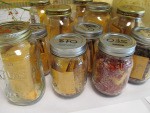We often hear messages about healthy eating to support a healthy, active lifestyle, such as limiting sugar and salt and eating enough vegetables and fruits.
We’ve also been hearing more about environmental aspects of the foods we eat, such as whether food production, processing and distribution contribute to climate change, impact biodiversity, and protect healthy soils, fresh water, oceans, and air.
These messages come as we see: rising rates of diet-related chronic disease; the combination of hunger and famine in parts of the world devastated by conflict, environmental degradation, climate change, and failed political systems; and ecological systems that may not be able to support food production for future generations here and around the world.
Can sustainable diets be the solution?
Proposed in the early 1980’s, the concept of “sustainable diets” has taken a long time to enter mainstream conversations. Sustainable diets brings together ecological and human health dimensions of our food systems so that what we eat supports health for everyone. Elements of social sustainability also include consideration of how workers are treated, whether animals are cared for humanely, whether producers and workers can earn a liveable income, and whether these foods are affordable and accessible for everyone.
It sounds good, but what is a sustainable diet? Unfortunately, it’s not simple.
- There is often a lack of information from food producers and companies to help us understand the environmental and social impacts.
- It’s also location dependent; a sustainable diet in Nova Scotia will look differently to one in Nunatsiavut or Nigeria.
- Plant-based proteins are generally considered more climate friendly than animal proteins, but almonds, for example, are a highly water-intensive crop. The relative merits aren’t always clear.
Is there any good news?
The proposed revisions to Canada’s Food Guide (CFG) from Health Canada incorporate elements of healthy and sustainable eating that, while maintaining focus on human health, proposes some approaches that will benefit both people and the planet.
Currently in its second phase of consultation (online comments open until August 14th), the draft CFG has three overarching principles:
- A variety of nutritious foods and beverages are the foundation for healthy eating (e.g., a shift towards plant-based foods);
- Processed or prepared foods and vegetables high in sodium, sugars or saturated fat undermine healthy eating (e.g., avoiding beverages high in sugar, such as pop); and
- Knowledge and skills are needed to navigate the complex food environment and support healthy eating (e.g., understanding where food comes from and eating together).
It also incorporates traditional/wild-caught foods vital for many Indigenous communities, the cultural and social importance of food.
Agriculture and Agri-Food Canada is leading the development of a food policy for Canada in partnership with other federal departments and in consultation with Canadians (online consultations end August 31, 2017). Food Secure Canada has been advocating for sustainable diets as part of a comprehensive food policy for Canada that includes: food as a human right, healthy and sustainable food, sustainable food systems, food and reconciliation, and having more voices at the table.
The challenge is in creating real, long-lasting change. We need to get serious about the link between food production, ecological health and human health. We also need to get serious about eliminating poverty, racism and inequity so everyone has the opportunity to achieve a sustainable diet. With the conversations happening across the country, this feels like an important and exciting moment to consider how we can build healthy, just and sustainable food systems for all.
For more information:
- Food Secure Canada: Champion Healthy and Sustainable Diets, Briefing Note
- The EAT-Lancet Commission on Food, Planet, Health
- Dr. Tim Lang, Video (34 mins), What is a sustainable diet?
Blog written by: Satya Ramen, Senior Coordinator, Ecology Action Centre
Adventures in Local Food is your source for food news in Nova Scotia, from pickles to policy. It is a project organized by the Ecology Action Centre.
Learn more about our program at https://www.ecologyaction.ca/ourfood
Or follow us on:
- Twitter: @OurFoodProject and @EcologyAction
- Facebook: The Ecology Action Centre
- Instagram: ecologyaction

